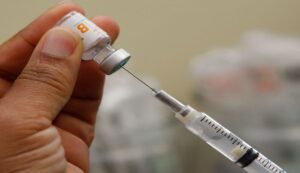Kennedy’s Influential CDC Panel to Vote on Controversial Hepatitis B & COVID Vaccine Policies
CDC vaccine panel decision: A conference scheduled for Thursday and Friday by the CDC’s hand-picked vaccine advisers to U.S. Health Secretary Robert F. Kennedy Jr. may lay out a new course for the nation’s immunization program.

Kennedy’s CDC panel set to decide on critical vaccine policies
Longtime anti-vaccine activist Kennedy earlier this year dismissed all 17 members of the CDC’s Advisory Committee on Immunization Practices, replacing them with a smaller group that currently includes 12 new members.
Hepatitis B, measles-mumps-rubella-varicella, and COVID-19 vaccination recommendations are scheduled for consideration and voting by the vaccine advisory committee on Thursday and Friday, respectively.
Risk of a Combined MMR-VARICELLA Shot is examined by the panel.
Martin Kulldorff, an epidemiologist and biostatistician who was sacked from Harvard for refusing to take a COVID-19 vaccination and who openly condemned COVID-19 lockdowns, chairs the group. He said that the panel will investigate the use of a measles, mumps, rubella, and varicella vaccine in June.
Compared to children who had individual measles, mumps, rubella, and varicella vaccinations, children under the age of four who received the combination dose had a greater risk of seizures.
Unless parents indicate a desire for the combination dose, the CDC currently advises that children under the age of four get separate MMR and varicella vaccinations.
VACCINE FOR NEWBORN HEPATITIS B UNDER REVIEW
The committee is also anticipated to debate and maybe vote on the present proposal to give babies a dose of the hepatitis B vaccination. A Kennedy colleague recommended that the committee postpone the first dosage of hepatitis B until age four, a former CDC official told the Senate on Wednesday.
A virus called hepatitis B may cause cirrhosis, liver cancer, or even death.
“Unless the mother is hepatitis B positive, an argument could be made to delay the vaccine for this infection, which is primarily spread by sexual activity and intravenous drug use,” he said.
However, a number of medical professionals, notably Republican Senator and physician Bill Cassidy, have maintained that it is an essential immunization for infants.
“The U.S. didn’t make much progress in combating hepatitis B until they moved to the birth dose,” said Noel Brewer, a member of the committee who was sacked. “They had tried risk-based vaccination, and it didn’t really work very well… people who are high risk rarely think of themselves that way.”
A VACCINE POLICY CLASH CAUSES CDC DISRUPTION
The meeting follows CDC chief Susan Monarez’s dismissal. Monarez, who argued with Kennedy on vaccine policy, claims she was asked to approve the committee’s recommendations.
A number of top CDC personnel resigned as a result of the turmoil, claiming worries that policy choices were being made without first undergoing scientific assessment.
During a Senate committee hearing on Wednesday, she said that Kennedy had informed her that the vaccination schedule will be altered in September.
Former FDA top scientist Dr. Jesse Goodman expressed his specific worry about the hepatitis B vaccination ruling, claiming that no new proof of danger has been found.
“This is a watershed moment where, if the forces of rumor and innuendo overcome the real data and information, we could be headed for big troubles,” warned Goodman. “You don’t want your kids, or someone you love, to have an incurable infection that, particularly if you get it in childhood, can lead to cirrhosis and liver cancer and liver transplantation.”